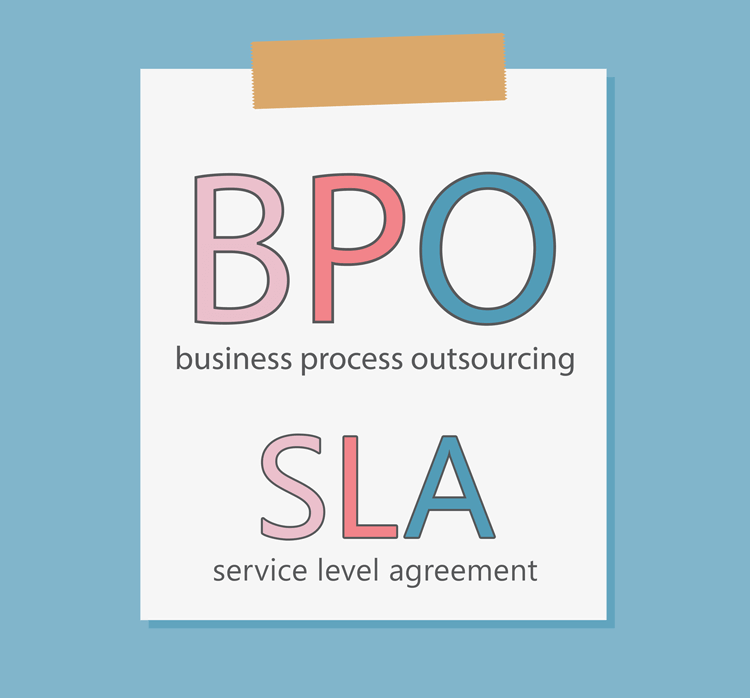BPO SLAs: How to Prevent and Resolve the Most Common Disputes
What is BPO: Business Process Outsourcing?
BPO stands for Business Process Outsourcing and is the contracting of services to third-party companies that can provide them more inexpensively or more efficiently than your organization. Businesses outsource their work for many reasons but are most commonly looking to decrease costs, expand capabilities, or lessen risks.
Some common outsourcing services include:
- Customer Service, Call Center or Help Desk
- Client Management
- Human Resources
- Accounting and Finance
Third-party providers deliver these solutions using cost-efficient approaches.
This article will focus on call center providers, although many of the principles also apply to other outsourced services.

What is a BPO Service Level Agreement (SLA)?
A BPO SLA is a contractual agreement you sign with your third-party outsourcer that defines measurable service requirements. These can include metrics such as response times, resolution rates, data security measures, and staffing quality.
It establishes clear guidelines and defines roles to ensure smooth cooperation between both sides, and acts as both a performance benchmark and a legal safeguard.
Further, it sets expectations so you don't set yourself up for failure from day one, and is one of the most important documents in Business Process Outsourcing and sets the tone for the entire outsourcing relationship.
The SLA outlines Key Performance Indicators (KPIs) that will measure success and includes:
- The client's and BPO's responsibilities
- Scope of services
- Stakeholder duties
- Budget and payment plans
- Service timelines
- Mediation processes or penalties in case of disputes
For that reason, it's absolutely essential that the Service Level Agreement be heavily referenced during Business Process Outsourcing negotiations so that both parties are aware of what's expected and can provide input during this process.
What Are the Key Elements of a Strong BPO SLA?
An effective BPO SLA should cover more than just costs and deadlines. Important elements include:
- Scope of Services: Which processes are included (e.g., customer support, HR, finance).
- KPIs & Metrics: Benchmarks such as first-call resolution, uptime percentage, or accuracy rates.
- Reporting Cadence: Weekly, monthly, or quarterly performance reviews.
- Penalties & Remedies: Consequences for underperformance, including financial penalties or corrective measures.
- Change Management: How the SLA will adapt to evolving business needs.
- Data Security Clauses: Safeguards for handling sensitive customer or corporate information.
What Are Common BPO SLA Disputes?
Having an SLA does not guarantee that there will not be any disputes between the client and the BPO. Here are some common disputes that are faced during and should be addressed specifically beforehand in a BPO Service Level Agreement:
-
Insufficient Budget Allocation
In cases where very little budget is allocated to Business Process Outsourcing, there can be many complaints about the BPO team not having an adequate amount of time to perform its tasks properly. This can lead to services being handled in a haphazard fashion, resulting in poor services and wasted resources.
-
Outdated Technology
Businesses rely upon their technology partners to keep them in line with modern trends and techniques, as well as give them access to new ideas and technologies they may not have considered.
-
Misaligned Business Priorities
Misaligned business priorities can affect the Business process in a way that negatively impacts both parties. Business Process Outsourcing is supposed to help the Business, but if they are not working together towards common goals, then there is very little Businesses can do other than complete the contract and hope for better results next time around.
-
Poor Training and High Turnover
When BPOs do not allocate enough budget and have high employee turnover, the quality of service can suffer terribly. When new agents are hired and not trained properly, they will lack the skills needed to address your customers' problems. The result? Customers will only remember a negative experience with your company, not the BPOs.
-
Loss of Business Data
A call center BPO is responsible for extensive call data and product knowledge management. With outdated technology or insecure data management, your BPO can lose data or become susceptible to security threats. If you have a contract that allows the BPOs to take your business offline until they remedy their issues, then this could be a major concern, since this kind of outage could hurt the business in worse ways than just lost revenue.
-
Failure to Meet KPIs
If a Business Process Outsourcing company fails to meet Key Performance Indicators (KPI), it could potentially harm the reputation of your company.
-
Schedule Overruns
A BPO project may go over schedule, especially if there are several cross-department projects being conducted simultaneously or last-minute changes in the requirements of requests. This costs time and money and is particularly damaging when multiple departments are impacted.
-
Low First Call Resolution (FCR) Rates
A First Call Resolution rate is how many calls the Business Process Outsourcing provider handles correctly on the first attempt. BPO companies need to boost this rate by identifying issues early and coaching employees on how to solve them. When they fail to do so, the BPO increases unnecessary call time and decreases customer satisfaction.
-
Strict Call Turnover Metrics
The Golden 80/20 Rule is not so golden anymore. This service rule entails that 80% of calls incoming into the call center should be answered within 20 seconds. However, this adds pressure on the agent to resolve the customer's concerns as fast as possible or transfer to another department, which can create frustration for the customer. In the end, the customer spends hours being transferred between agents without a resolution, and this kind of service will reflect poorly on your company.
-
High Employee Turnover Rate
One of the biggest challenges facing Business Process Outsourcing providers today is staff retention and the availability of workers with the right training and experience. This results in uncertainty of whether or not the quality of service will decrease over time.
-
Agents Lacking Product Knowledge
When agents do not properly understand your product or service, they fail to provide your customer the right information. This again results in caller dissatisfaction and may result in low customer retention.
How to Prevent and Resolve These Disputes
However, not all is lost. There are ways to resolve them, or more ideally, mitigate these situations beforehand:
-
Verify of the Latest and Most Secure Technologies
Before deciding to even move forward with a BPO, you need to make sure they have access to reliable, secure networks and data storage systems, which are vital components in any operation. It is critical to be cautious with data security and threat management to keep your business safe from losses you may incur through downtime.
-
Ensure Knowledgeable and Trained Agents
It is important for you to identify whether or not your outsourced call center has a good knowledge system to quickly resolve issues. This can end up preventing a multitude of problems, as those noted above.
-
Define an Escalation Path
Pre-set a clear chain of command for dispute resolution, outlining which managers or executives are involved at each stage. This prevents issues from stalling at the tier-1 support level.
-
Include Mediation Clauses
Include provisions for third-party mediation before legal action is taken. This helps disputes get resolved faster and more cost-effectively.
-
Set Corrective Action Timelines
Establish specific deadlines for fixing performance failures. For example, you could determine the requirement of executing remediation within 15 business days. Timely action prevents small problems from combining to become a large problem.
-
Establish Routine Reporting
You should require routine KPI reporting of calls handled by the BPO and their resolutions and root-cause analyses of any SLA breaches. These insights allow you to identify systemic issues early.
In addition, keeping the BPO on task is important because you want them to reach necessary BPO KPI metrics milestones as efficiently as possible for success in their services.
-
Allow for Continuous Improvement Updates
It's important to have flexibility in the SLA by committing both parties to review and update performance metrics as business needs evolve. This helps keep the SLA relevant over time.
-
Require Budget Transparency
You should also require submission of a budget detailing all service fees. This provides transparency, which helps you hold the BPO accountable if needed.
-
Encourage Collaborative Teamwork
Have your team meet often with the BPO's frontline staff. This collaboration helps blend operational cultures better, and help the BPO's customer-facing agents understand your business values more.
What Are the Important KPIs to Track in a BPO SLA?
As noted above, establishing and tracking Key Performance Indicators (KPIs) is a critical part of the BPO's service process.
The following are KPIs you should include in your BPO SLA:
- First Call Resolution (FCR): Percentage of issues resolved on the first contact
- Average Speed of Answer (ASA): How quickly agents pick up calls
- Customer Satisfaction (CSAT): Survey scores after interactions
- Service Availability: Percentage uptime of systems and platforms
- Error Rate: Share of incorrect or incomplete transactions
These KPIs must be measurable, realistic, and directly tied to business outcomes like customer retention and cost efficiency.
What Are Some BPO SLA Negotiation Best Practices?
Since the best way to prevent SLA disputes is to get the agreement right at the start, here are some best practices when negotiating the SLA with your BPO:
- Insist on Specific Metrics: Replace vague promises with measurable targets
- Tie KPIs to Business Goals: For example, link response times to customer retention
- Use Tiered Penalties: Repeat underperformance should trigger escalating consequences
- Plan for Flexibility: Business priorities change, and so SLAs should allow for updates
- Document Accountability: Require structured review meetings and dashboards to ensure responsibility
The Right SLA for the Right BPO Services
Companies that outsource lose money when there is a problem with processes and require additional time to correct problems caused by Business Process Outsourcing. They can also face reputational damage from customers if the BPO is unable to deliver on time, resulting in customer churn or dissatisfaction. They can also incur extra expenses for companies hoping for everything to run smoothly without any glitches or hiccups because of outsourcing.
The steps mentioned above are a great way to try to mitigate unnecessary problems and that disputes are avoided by all stakeholders.
Giva Software Can Help Streamline BPO Customer Support
Help your BPO support teams provide the best service with our help desk or customer service software solutions:
- Boost visibility and productivity with real-time dashboards
- Spend more time with customers and less with setup
- Make fast business decisions with deep and comprehensive out-of-box reporting and analytics
- Giva's AI Copilots help agents close tickets and retrieve answers quickly
Ready to learn more? Get a demo to see Giva's solutions in action, or start your own free, 30-day trial of Giva today!





